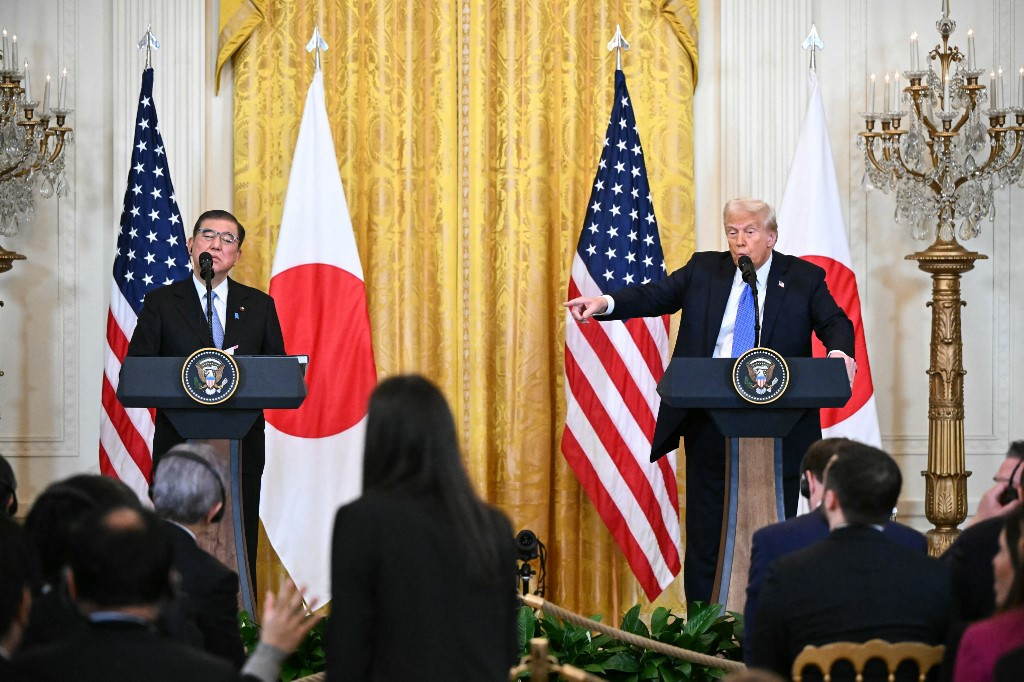Popular Reads
Top Results
Can't find what you're looking for?
View all search resultsPopular Reads
Top Results
Can't find what you're looking for?
View all search resultsJapan needs a true vision of peace for the next 80 years
Japan has overcome much in the 80 years since World War II, but in the contemporary landscape of geopolitical tensions, climate change and demographic challenges, it needs to significantly speed up its transformation toward the next eight decades.
Change text size
Gift Premium Articles
to Anyone
I
n 1979, Harvard University professor and American sociologist Ezra F. Vogel published a book that became a runaway bestseller in both Japan and the United States. While most commentators at the time focused on the eye-catching main title, Japan as Number One, its subtitle was equally compelling: Lessons for America.
Vogel at times joked that his book had sold for the wrong reasons. He had tried to understand and explain the societal forces behind Japan's economic miracle, but an even stronger motivation had been his alarm at America's decline. He thought it was Japanese society as a whole that carried lessons for the United States.
Living in Japan, I find myself periodically revisiting Vogel's book, reflecting on its ongoing relevance for our times. As the US moves in directions unknown to its allies, enemies and maybe even to itself, what lessons might he have drawn for Japan today?
He would start with a reality check of Japan's deep-rooted challenges: a region fraught with geopolitical tensions, the constant risk of large-scale natural disasters, an aging and declining population and other woes. Yet he would also be the first to remind of Japan's strengths, such as its peace credentials, its resilient democracy and rule of law, its educated population, its safety, world-class cultural traditions and public institutions.
In light of the political and societal changes unfolding in the US, however, I believe there are at least three immediate areas where Japan needs to significantly speed up its transformation: in peace diplomacy, higher education and environmental sustainability.
How can Japan maintain its peace credentials in a period of increasing security threats and military buildup in the region? How can it ensure its own protection and safeguard alliances, while at the same time preserving the Peace Constitution's legacy? How can it control a rising military budget without damaging the country's social fabric at a time of competing national expenditures?
My peace activist friends in Hiroshima often criticize their government for not providing meaningful leadership in nuclear disarmament negotiations. On the other hand, considering Japan is under the US nuclear umbrella, the government's stance is bound to be, at best, a difficult balancing act.
Despite such constraints, Japan can do more to articulate its own unique and genuine vision of peace. Tokyo remains far too deferential to Washington. As times change, the world needs a more independent expression of what Japan means when it says “peace”.
As to higher education, Japanese universities lag significantly in global rankings, with its best performer, the University of Tokyo, currently at around 28th. Despite decades of policies to consolidate and internationalize, the sector struggles to attract foreign talent.
Japan's affordable higher education and attractive culture and society could be strong draws for international students, particularly at a time when many worry about the US administration's policies on student visas and unsettling moves to muzzle academic freedoms.
Yet language barriers and a lack of professional opportunities for foreign graduates remain daunting. I have worked with many bright students in Japan who, ultimately and reluctantly, left the country after graduation to settle elsewhere.
This is a great loss. Japan needs to attract and keep foreign graduates and young professionals, helping them integrate much more easily. Language acquisition is key.
Finally, it is clear that the current US administration has decided to abdicate its environmental leadership role. Japan can step in to fill the gap, but currently punches far below its weight: in a 2024 OECD survey of 30 countries, Japan ranked 23rd in sustainability.
Despite technological prowess and a vast potential for renewable energy from geothermal, solar and tidal sources, it is still highly dependent on fossil fuels for its energy needs.
While ordinary citizens diligently sort out the mountains of plastic waste the country produces, groundbreaking innovation in waste management or the circular economy still seem a distant future. Efforts lag in decarbonizing infrastructure and promoting green architecture, and the promised green revolution advances more at a crawl.
For a country that seamlessly marries high-end technology with the traditions of mottainai (regret over wastefulness) and wabi-sabi (imperfection and impermanence), Japan is a natural source of leadership in addressing environmental threats. It should seize the chance.
Eighty years after the war, Japan has overcome many challenges, but it cannot remain as it is. To paraphrase the main character in Giuseppe Tomasi di Lampedusa’s novel The Leopard, "For things to remain the same, everything must change."
---
The writer is a cofounder of Green Legacy Hiroshima, a global initiative that promotes peace through atomic-bombed trees, and an original member of the United Nations Institute for Training and Research who was the first director of its Hiroshima office.











